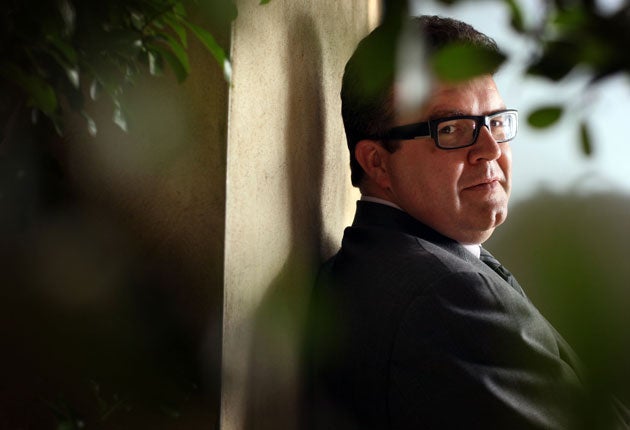Parliament is reinvigorated and our MPs are finding their voice at last
Rise of the little big men and women. By Steve Richards

Some unlikely political stars are lighting up the summer skies. Pick up a newspaper and there is every chance that you will see as many photos of the Labour backbencher Tom Watson as you will an image of David Cameron sipping a cappuccino in Tuscany. Log on to Twitter and a major talking point is the latest thoughts of the Conservative MP Louise Mensch. I have just logged on and Mensch is tweeting to her new army of followers that they should read the most recent flattering newspaper profile of Watson. One new star shines on another, transcending party differences.
Keith Vaz is another Labour backbencher who has commanded the airwaves almost as much as any Cabinet minister in recent weeks. A few days ago he captured the headlines when he met the father of Amy Winehouse. Not so long ago Vaz had disappeared from public view, suffering from ill health when he was a supposedly mighty minister of a Labour government at the height of its powers. Now, as an apparently powerless backbencher, he is everywhere. Before becoming a part player in the post Amy tragedy, he was the chief interrogator of the senior police officers at the Met as Chair of the Home Affairs Committee.
Fast-forward to yesterday morning. The lead item on the Today programme was a report from the Defence Committee critical of the Strategic Defence Review that took place last summer. Its Chair, James Arbuthnot, was the main interviewee at the peak 8.10 slot. The essence of his argument was accessibly stark. The Government must either increase spending on defence or reduce its military commitments. The committee's review was more strategic than the haphazard, rushed equivalent carried out by ministers a year ago, an exercise shaped entirely by the Chancellor's need for spending cuts.
The connecting theme is that these suddenly prominent figures are members of parliamentary select committees. Watson and Mensch are on the Culture Committee. Vaz and Arbuthnot preside over Home Affairs and Defence. Until recently the committees were something of a backwater for MPs, largely ignored by the media and viewed with indifference by ministers. They produced their reports. Some of them were extremely insightful and provided an important alternative commentary on various governments. Rarely did they get much publicity. No member acquired such an aura that he or she became associated with sex appeal. This has changed. Suddenly committees are sexy.
The hacking saga transformed parliamentary committees into theatrical arenas. Those who were at Westminster on the day when the Murdochs came to town will never forget it. The atmosphere was more highly charged than during the five days after the election during which the Coalition was formed. The Culture Committee was the main focus and before it the Home Affairs Committee had another day in the sun, recalling Yates of the Yard amongst others for a final interrogation. Not surprisingly in such a context, the media leap to attention.
But other factors play their part too, or at least help to make one extraordinary story part of a wider pattern and not a one-off. Parliament is coming to matter more. In the Commons no party has an overall majority and in such circumstances MPs become more powerful. Individuals can bring down a government if they choose to do so. If they choose not to do so they can at least change policies. Andrew Lansley's original plans to overhaul the NHS were doomed when the Liberal Democrats' spring conference voted against them by a massive majority. The party's MPs could not ignore such a verdict, and without those MPs, David Cameron had no majority.
Committees have more independence. This is the first parliament in which MPs have elected the chairs of the committee. Government whips can no longer appoint figures who will be a soft touch. After winning a second landslide in 2001, Tony Blair tried to remove the formidable Gwyneth Dunwoody as Chair of the Transport Committee. He did not succeed – Dunwoody kicked up an almighty fuss – but Blair already had a docile House of Commons and could have coped with the occasional criticism from a veteran MP. New Labour was ready to be held to account by the media alone and wanted a Parliament that did not cause it a flicker of concern. Such manoeuvring is impossible now. The MPs have a direct interest in asserting a degree of independence.
These are early days of the new pattern in which a hung parliament, elected committees and explosive news stories change the dynamics. Some of the questioning when the committees became theatrical arenas was naff. The hacking episode will fade at some point. But it highlighted a trend that was already taking shape. British politics is becoming slightly less presidential.
Take a look at the recent less than flattering photos of Cameron and Ed Miliband on holiday and compare them with those accompanying the glowing profiles of Watson, Mensch and others. Power has shifted a little to those who are supposed to hold the executive to account. Amidst a summer of darkly ominous economic news that is cause for a small celebration.
Subscribe to Independent Premium to bookmark this article
Want to bookmark your favourite articles and stories to read or reference later? Start your Independent Premium subscription today.

Join our commenting forum
Join thought-provoking conversations, follow other Independent readers and see their replies